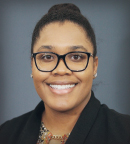
LaShae Rolle, MPH, BS, CPH
Although there’s no history of breast cancer in my family, when I was 10, my pediatrician introduced me to breast self-exams, so I would become familiar with my breasts and learn to spot any unusual changes as I got older. I remember her telling me this was an especially important exercise to do on a regular basis because nearly one-quarter of Bahamian women diagnosed with breast cancer are found to be carriers of the BRCA1/2 gene mutation.1 Those words stuck with me into young adulthood, and I believe may have saved my life.
In February 2024, I was working toward my PhD in prevention science and community health focused on cancer prevention research at the University of Miami Miller School of Medicine, Department of Public Health Sciences, and Sylvester Comprehensive Cancer Center, when I found a mass in my right breast. I was just 26, and with no family history or other known risk factors for breast cancer, I wasn’t initially concerned; only about 1% of all breast cancers are diagnosed in women younger than age 30.2 But as a cancer researcher with an interest in studying how the disease impacts individuals in minority populations, I immediately went to the student health center for a clinical breast examination, which was followed by a mammogram and then an ultrasound.
The imaging results showed I had multiple tumors in different quadrants of my right breast. A tissue biopsy of the tumors led to a diagnosis of stage IIB estrogen receptor–positive, HER2-negative, multicentric breast cancer. Even though I had been preparing myself for this possibility since I was a young child, and had been diligent about getting clinical breast exams in addition to doing my own breast self-examinations, I never expected to get a breast cancer diagnosis at such a young age, and the news was devastating. Fortunately, I have tested negative for all inherited gene mutations, including the BRCA1/2 mutations.
Taking Control
Once the shock of the diagnosis wore off, I began to take control of the next steps. I knew as a young woman, I was likely going to have to make some potentially life-altering decisions. I made an appointment with a surgical oncologist to discuss my treatment options and compiled a list of questions to ask her before we met. High on the list was a question about how the cancer and its treatment might affect my fertility. But before I could get to the question, my oncologist raised the issue with me. I would need surgery to remove my right breast, followed by chemotherapy and radiation therapy, she said. I knew the chemotherapy regimen she was recommending, which included paclitaxel and cyclophosphamide, would put my fertility at risk. In a split second, I had to decide if I wanted to have children in the future, and what procedures I was willing to go through to make that happen.
After learning about my treatment options for both the cancer and my fertility preservation, I decided to have my eggs harvested and frozen, and I hope one day that choice enables me to birth a child.
Pursuing a Career in Cancer Research
I have now completed all treatment for the cancer, and I’m thrilled to say that I’m cancer-free. Being a cancer survivor has given me new perspective on how this disease affects patients, and the experience has made me even more passionate about pursuing a career in cancer research, especially to better understand how the disease impacts younger adults and underserved minority individuals.
Because I believe strongly in the importance of participating in clinical trials, in addition to my own research pursuits, I’ve enrolled in the Caribbean Women’s Cancer Study (https://hboclab.com/index.php/project/caribbean-womens-cancer-study/), which is following women diagnosed with invasive breast cancer who are from The Bahamas, Barbados, Cayman Islands, Dominica, Haiti, Jamaica, and Trinidad and Tobago. The study is investigating the drivers of breast cancer and the shifting patterns in risk factors related to reproductive health in this population. I’m also participating in a study examining cancer’s impact on survivors’ mental health.
Making a Positive Impact
Being diagnosed with cancer has made me realize that this is not a disease limited to older individuals. We are all potentially vulnerable to its genetic and environmental risk factors—and just simple bad luck. I don’t know why I got cancer. I’m young and I’ve always been physically fit. But I’m not wasting time questioning “why me?”
Although my goal has always been to work in cancer research, having cancer has reinforced my life purpose to help other survivors and to make a positive impact on the world. I believe cancer happened to me for a reason, and that it is part of the plan for my life. Cancer has also made me a better version of myself. I call it my 2.0 version.
My experience with cancer has reminded me of an old adage: “You only live once, but if you do it right, once is enough.” I plan to do it right.
References
1. Narod SA, Butler R, Bobrowski D, et al: Short report: Follow-up of Bahamian women with BRCA1 or BRCA2 mutation. Mol Genet Genomic Med 6:301-304, 2017.
2. Anders CK, Johnson R, Litton J, et al: Breast cancer before age 40 years. Semin Oncol 36:237-249, 2009.
Ms. Rolle, 27, is a PhD candidate in prevention science and communityhealth focused on cancer prevention research at the University of Miami Miller School of Medicine, Department of Public Health Sciences, and Sylvester Comprehensive Cancer Center.
Editor’s Note: Columns in the Patient’s Corner are based solely on information The ASCO Post received from patients and should be considered anecdotal.

